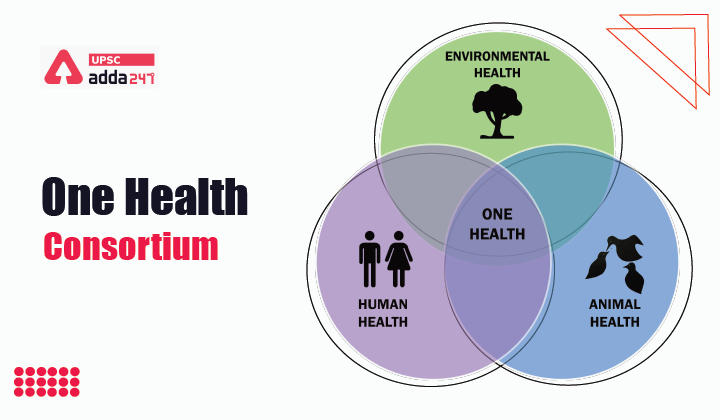Table of Contents
One Health Consortium: Relevance
- GS 2: Issues relating to poverty and hunger.
One Health Consortium: Context
- Recently, D/o Biotechnology, Ministry of Science & Technology, has launched Country’s first ‘One Health’ consortium.
One Health Consortium: Key points
- One Health Consortium consist of 27 organisations that are led by DBT-National Institute of Animal Biotechnology, Hyderabad, is one of the biggest one health programs launched by India in post-COVID times.
- The programme envisages carrying out surveillance of important bacterial, viral and parasitic infections of zoonotic as well as transboundary pathogens in India.
- The programme also proposes use of existing diagnostic tests and the development of additional methodologies when required are mandated for the surveillance and for understanding the spread of emerging diseases.
One Health Mission: Why important?
- One Health initiative emphasizes the need of a holistic approach to understand the health of human, animals and wildlife to minimize the damage caused by future pandemics.
- One Health consortium nurtures the concept of ‘One Health’ where man, animal, plants and environment are needed to be considered complimentary to each other for maintaining health of all.
A scheme before its time- National Digital Health Mission
What is One Health concept in Inda?
- One Health is a collaborative, multisectoral, and transdisciplinary approach — working at the local, regional, national, and global levels — with the goal of achieving optimal health outcomes recognizing the interconnection between people, animals, plants, and their shared environment.
- One Health is not new, but it has become more important in recent years.
Bureaucracy’s Digital Challenge
One Health India: Why needed?
- Following factors have changed interactions between people, animals, plants, and our environment.
- Human populations are growing and expanding into new geographic areas.
- As a result, more people live in close contact with wild and domestic animals, both livestock and pets.
- Animals play an important role in our lives, whether for food, fiber, livelihoods, travel, sport, education, or companionship.
- Close contact with animals and their environments provides more opportunities for diseases to pass between animals and people.
- The earth has experienced changes in climate and land use, such as deforestation and intensive farming practices.
- Disruptions in environmental conditions and habitats can provide new opportunities for diseases to pass to animals.
- The movement of people, animals, and animal products has increased from international travel and trade.
- As a result, diseases can spread quickly across borders and around the globe.
- Know about Pradhan Mantri Digital Health Mission from here.




 TSPSC Group 1 Question Paper 2024, Downl...
TSPSC Group 1 Question Paper 2024, Downl...
 TSPSC Group 1 Answer key 2024 Out, Downl...
TSPSC Group 1 Answer key 2024 Out, Downl...
 UPSC Prelims 2024 Question Paper, Downlo...
UPSC Prelims 2024 Question Paper, Downlo...
